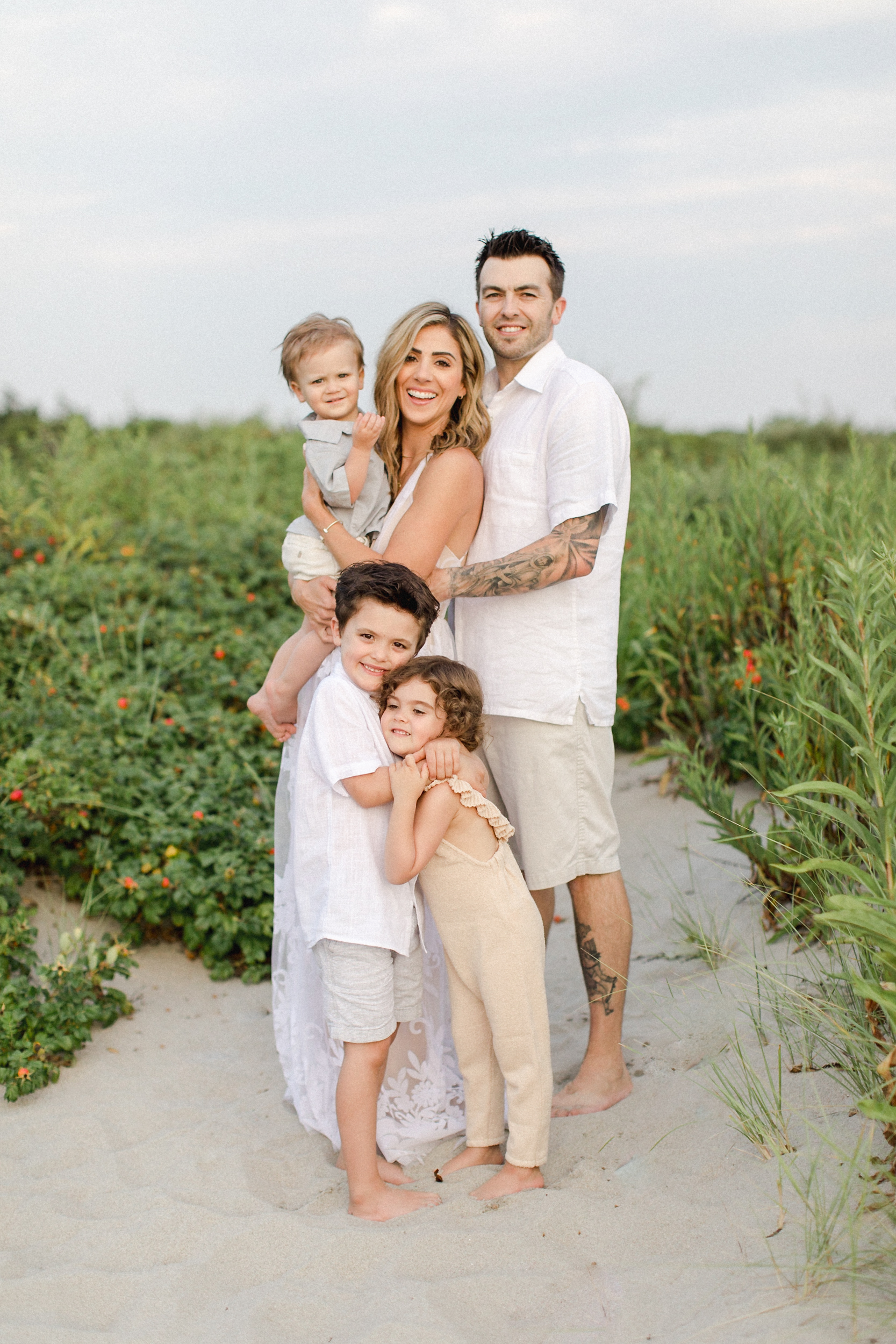How to Emotionally Support Our Children During a Pandemic March 18, 2020

I had the realization yesterday after my kids started acting out a bit that their little worlds have been completely turned upside with with this virus. My children are not only very involved in school, but also several activities and seeing their friends. None of these things can happen at the moment, and here in CT we don’t have any set date on when we can return to normal life. Their entire routine has been completely changed, and I’m sure some grief (whether or not they can understand that) is happening. I mean, I’m even feeling that grief! As a parent, I just want to emotionally support my children the best I can. I asked one my friends, Lauren Auwood, who’s a licensed family and marriage therapist to share How to Emotionally Support Our Children During a Pandemic in hopes this will help me AND you.
—————————————————————–
Figuring out how to emotionally support our kids through these major life changes right now is challenging. Not only are we navigating our own feelings through this, but we are carrying theirs as well. Here are some topics that may be coming up and helpful tips to support all of you through it.
1. ROUTINE. Routine provides a lot of emotional comfort to both parents and children. Routine tells everyone what to expect and when. The predictability and structure that routine brings can be very soothing, as it becomes a compass of sorts. If you haven’t already, create a daily schedule that hangs somewhere in a common area of the house that the family can always see. If the kids are able, let them be a part of the creation of it (within reason. Tablet time eight times a day may sound tempting to both of you but it could end up backfiring). Include them in this process by asking “What would you like your day to include?”. Giving them SOME (very tiny amount) of control through being encouraged to provide input and make choices can do wonders for soothing anxiety.
We know our kids will have some silly choices, some outlandish wishes, etc. The most important part in this is to validate their ideas, while still holding boundaries as the one in charge.
Example: My son says, “Mom we should make a birthday cake for a dinosaur in the morning and at night! And then we should jump on the couches for an hour instead of taking quiet time!”
An anxiety increasing response would be: “No, stop. That’s ridiculous. This is serious and you need to be serious about this schedule.”
A validating response could sound like: “Wow! Those are silly! Sounds like you’d like to bake something and get some exercise?! We can definitely do that. We will still have quiet time because that is healthy too. I know it’s frustrating. It’s okay to be frustrated about it. What time would you like quiet time to be at?”
2. GRIEF. The need for a new routine in this scenario means there has been a LOSS of an old routine. There is grief in any loss; the loss of the school bus ride, the loss of their classes and friends at school, the loss of the transition from school to home, the loss of weekdays being school time and weekends being home time. There are layers of loss and feelings associated with loss in this upheaval. We can keep routine all we want, but unless we are talking with our kids about why the routine is different and allowing their thoughts, feelings, and questions about it, the routine will only soothe one area of distress they may be experiencing.
Ask them what they miss right now. What’s their favorite part about going to school? What was their least favorite? Whatever they say, even if it’s that they miss something that doesn’t quite make sense to you, validate it. Validate, validate, validate.
Example: My son says, “I really miss seeing my friends all day every day. I miss my desk and Mrs. Smith.”
An unhelpful response could be: “Well just be glad that you aren’t sick or that they aren’t sick. You are home because we have to do our part to stop the sickness from spreading. Be grateful.”
A supportive and validating response might sound like: “Yeah, you are really missing your friends. It’s really hard and sad to not see everything you’re used to seeing every day. What else do you miss? I miss things too.”
Elicit conversation. Be curious. Ask your kids, “Tell me more.” Or “What else?”. Normalize their feelings even if (especially if) you can’t understand them. The specifics don’t matter. We have ALL felt confusion, sadness, anxiety, anger. Just hear that in whatever they are expressing and listen. You can do this while they color, you can do this while you cook. You can talk like this while playing on the ground. And here’s the really good news: if you don’t know what to say, you don’t have to say anything. You are not required to fix their feelings. Simply sit with them in their feeling, nod your head and say, “I’m here with you.”
The book “The Invisible String” is a fantastic resource for kids of all ages to be reminded that we are connected to our love ones even when we can not see them. Another therapeutic activity may be to write letters to our friends that we are missing and have fun mailing them out.
3. ANXIETY. Anxiety means a lot of things for a lot of different people. Anxiety looks and feels differently to many people. For some of our kids they may be behaving in unfavorable (to say the least) ways that are driving us crazy. They may be being rude, irritable, grumpy, mean, sad, overly energetic, etc. Their behavior is their way of communicating what their underdeveloped brains cannot quite articulate fully yet. They feel the energy in the air, in our homes. They are ALLOWED to have a reaction to all of this. By taking care of ourselves and our anxious energy the best we can, the energy in the home will return to neutral.
Grounding and mindfulness techniques for kids can be incorporated into your daily schedules with them. YouTube has a ton of grounding and guided meditation videos for kids. Engage in it with them (we all need it right now). Pinterest has great resources for fun and feelings-provoking conversation. “Kids Feelings Jenga” is an example which will encourage them to share AND play (you can adjust the questions to more age appropriate ones if needed). Pinterest also has worksheets for kids, like “The Worry Tree” where they can put their feelings to words and to paper. Create your own “worry tree” with them to normalize different thoughts and feelings. It is important that what we share is kid appropriate and that we balance it with ways to cope with the worries.
Our kids are asking tough questions right now; so many of which we have no idea how to answer. While I can’t give advice on the best way to speak to every single child (since each are their own person and different), I do know that keeping things child-appropriate are best. “When can I go back to school?” Responding with, “I’m not sure yet love but as soon as I know, I promise I will tell you.” It may help them to keep asking, every day, or once a week. If they are continuing to ask you, that’s a signal that you’re doing something right because they feel safe enough to ask. It’s our job to keep those doors for communication open.
They can’t understand that there’s a virus in the air that is spreading too quickly. And we don’t want to provide them with too much adult information that can scare them since they can’t digest it the way we can. Sharing that everyone is being asked to stay home right now so all of the helpful people in the world can keep making us safe may be the best way to communicate what’s going on in the world with our kids. They will have questions and we can only give them space to ask as we breathe through the questions and answer the best we can. You know your kids best; you know what they can hear best.
A helpful books for kids to read about their anxiety is called, “Up & Down the Worry Hill”. Read it with them if you can and ask them to share their thoughts and how they relate to the book.
4. THERAPY! Listen folks, I’m buyin’ what I’m sellin’. This portion of this article is just as much (if not more) for the parents as it is the kids. The reason so many parents feel completely lost right now as to how to support their kids through their lives being flipped upside down, is because it’s hard to sit with anyone’s (Especially our babies) discomfort. Therapists are trained to do it. It is really, really hard to be someone’s mom, parent, teacher, and therapist every second of the day like this situation is asking us to do.
So many (I’d say most) of us therapists have switched to providing tele-health only currently. We are accepting new clients. You can sit with your kids during their virtual sessions if they are comfortable with it, and until they’re comfortable to meet with the therapist alone. Reach out to your healthcare provider for a list of in-network therapists, check out psychologytoday.com and you can filter what exactly you’re looking for in a therapist.
The only way to support each other through this is to support ourselves. Think about what you’re needing if you’re feeling anxious, restless, hopeless or scared. Think of ways to meet those needs; it will may likely mean getting creative. Please remember that you are not alone in this strange circumstance. Now more than ever we are learning that it truly does take a village.
Lauren Auwood, LMFT
Licensed Marriage & Family Therapist






This was a very helpful post to read through. I have been homeschooling for three years now.. but explaining to my kids they can not have play time with their friends has been tough!! This is a difficult time and this post has been an encouragement I needed to stay strong and just talk it out and communicate with my little ones! Love this!! 🤍 Thank you for sharing!!
Hi! OMGosh I havent seen your blog in years (bc now im stuck at house during convid19!! I remember when your oldest boy was itty bitty and then you were just preg with your girl! Now you have 3!! Then I realized you were preg same time as me when i had my 4th….so much morning sickness. I’m now catching up on my blogging this year. My hubby is on the TaskForce for the pandemic bc he’s Public Health physician….and we actually just moved back to VA from Boston from his 2 yrs at Harvard. Anyways ‘hi’ and thank you for writing post, your blog is still wonderful.
Great advice!!